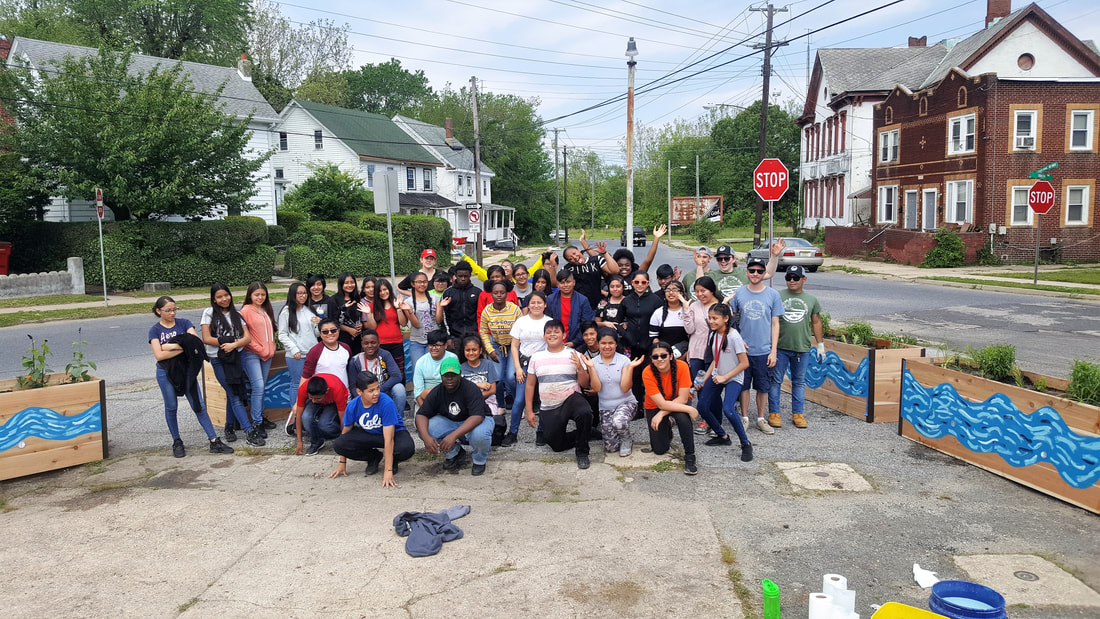|
Before heading down the shore for Memorial Day, Carla Burlingame’s class from ExCel School is starting the transformation of a vacant lot in Bridgeton into a park with tree plantings, rain gardens, planter boxes. Bumblebees and butterflies are expected to visit in droves, stopping for a drink in the students’ flowers, trees and garden. But this humble patch of wildflowers and spongy soil is more than a seasonal oasis for pollinators; it holds the key to keeping South Jersey’s drinking water clean and plentiful all year long. “Not only are they learning to take care of their environment and community, but how important it is to be an involved, active citizen.” says Burlingame. “A student recently cited these community green-up days as highlight of her 7th grade year. The trip taught her how important it is to take care of her community and how it’s everyone’s job.” The rain garden is only part of ongoing efforts to protect forests and farms, clean up streams, and make cities and suburbs greener in southern New Jersey. That work is designed to ensure swimmable, fishable and drinkable water in the Delaware River and its tributaries. In addition to the rain garden work, Burlingame and her students planted trees along the Cohansey River, participated in a Bridgeton city clean-up and kicked off the transformation of a blighted vacant lot into a new community park with the help of two partners, the American Littoral Society and Rutgers Water Resource Program. Both organizations are part of the ‘South Jersey Water Savers,’ a collaborative between nine area nonprofits helping the community learn about and protect the Kirkwood-Cohansey Aquifer. Located just beneath the ground and stretching from Cape May, NJ to Asbury Park, the aquifer provides most of the water for South Jersey’s homes, farms and businesses. The South Jersey Water Savers campaign is led by the American Littoral Society, and supported by the Association of New Jersey Environmental Commissions, the Natural Lands Trust, New Jersey Audubon, the New Jersey Conservation Foundation, the Partnership for the Delaware Estuary, the Pinelands Preservation Alliance, Rutgers Cooperative Extension, and South Jersey Land & Water Trust. South Jersey Water Savers is also part of the larger Delaware River Watershed Initiative, uniting communities and organizations to protect forests and farms, clean up streams, and make cities and suburbs greener – all to ensure drinkable, fishable, swimmable, water in the Delaware River and its tributaries. “The sources of our drinking water are extremely vulnerable,” says Emma Melvin, Delaware Bayshore Program Director for the American Littoral Society. “It’s vulnerable to polluted runoff from roads and fields, to intrusion from saltwater, and over-use, especially as summer heats up. “However,” Melvin notes, “there are things we can all do – from planting rain gardens and installing rain barrels, to making homes and businesses more water efficient, to preserving open space and harnessing stormwater – to make sure we have clean water for drinking, farming and fishing.” As just one example, the Water Champions program helps teach students about the issues facing our local water supply and the various ways in which people can make changes to conserve water. The goal is for students to be inspired to make changes in their own lives, as well as in their schools and communities. Through the program, students are walked through the process of doing water audits of their own homes, schools, and local businesses. These audits involve making an inventory of all of the water using fixtures, the rate at which they use water, and how often they are used. With this data, program participants can identify areas for improvement, either through appliance upgrades or behavioral changes. Through the Water Champions program students at Ocean City High School determined that the Intermediate School had greater potential for improvement because it is older and with less efficient fixtures than the High School. Grant money was then used to install high efficiency fixtures in the most used boys and girls restrooms. In Lower Cape May Regional High School, grant money was also targeted to update the most frequently used restrooms. However, thanks to the efforts of the students, the district’s school board decided that it would be best to update all of the restrooms in the whole over the summer. Learn more about South Jersey Water Savers initiatives and programs at the newly launched website. The site provides additional tools and tips, along with stories of other everyday water heroes. Comments are closed.
|
Archives
July 2024
Categories
All
|


